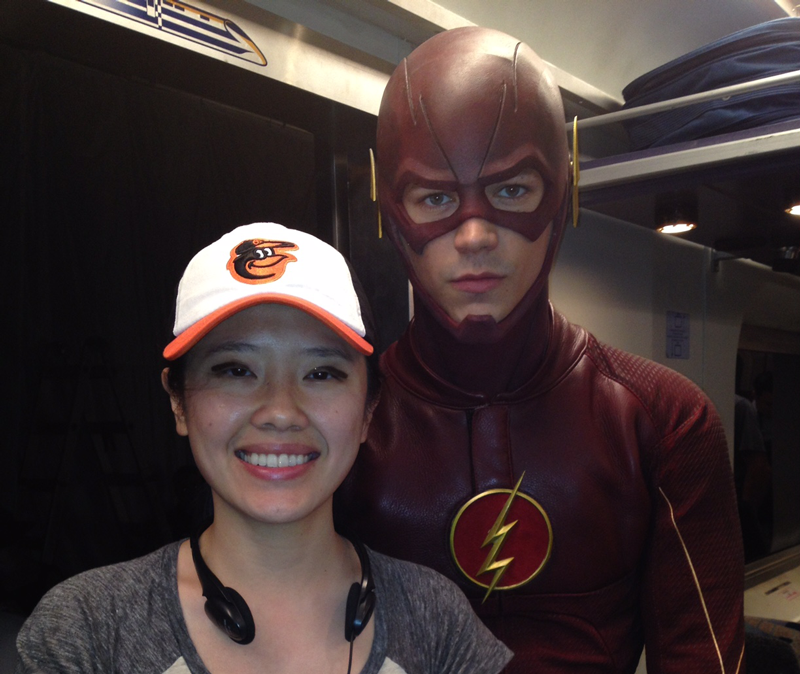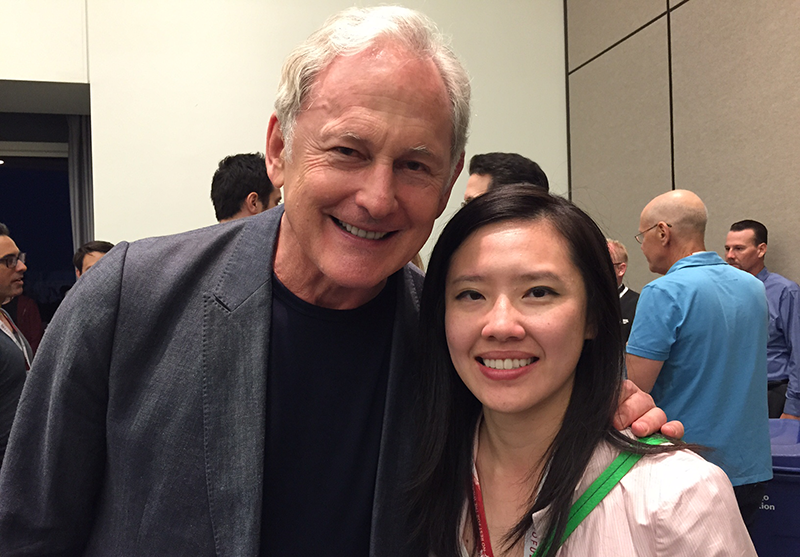The Flash executive story editor and writer, Kai Wu, didn’t originally want to be a writer. While she was growing up she used to think, “I guess I’ll be a Red Lobster manager, or something like that.” Born in Taiwan, Kai moved to the US a the age of 7 and raised in a small American town. However, her life changed upon seeing the movie Casper on the big screen. The movie not only pushed her to become a writer, she loved it so much that she also has everyone’s favorite friendly ghost tattooed on her skin. Since then Kai has made a career as a television writer and risen in the ranks by making waves on critically acclaimed shows like the deceased Hannibal and CW’s hit show The Flash. Jes Vu caught up with Kai recently to chat about her career.
What made you end up in TV writing?
I kind of fell into by accident. I didn’t really watch TV growing up except for Full House—I only watched movies. I worked at Gersh Agency, was an assistant in the Motion Pictures Lit Department, and went into development—I wanted to be in features then. I was really lucky there was a point someone had to help someone out. One of my co-workers at Gersh—an old co-worker—knew a showrunner, and said I’m looking for a writer’s assistant [job]. And he knew I wanted to be a writer, so he passed my resume along. I interviewed and I was very lucky to get the job. But I had no idea what writer’s assistant meant in TV. So I took it. I hated television because of that routine of going in every day—and I was a crappy writer’s assistant because I had no idea what I was doing. But I was also the showrunner’s assistant, which I was great because of my agency experience, so they didn’t fire me, thank goodness! After that, I didn’t want to be in TV again, but then I got a job on Burn Notice as Matt Nix’s assistant. I learned so much there, and from then, TV popped for me a little. People were responding to my TV samples more than my features, so I just went with it.
Your first staff writing gig was on Hannibal for Bryan Fuller—How did you get involved in Hannibal as well as The Flash?
I was, and I still am Bryan Fuller’s biggest fan. As a fan, I was obsessed with his work. Wonderfalls is my favorite television show, and I loved Dead Like Me. Through all my assistant jobs, I had met this woman named Kath Lingenfelter—an amazing writer—she wrote on Pushing Daisies. I knew Hannibal had gotten picked up, and I asked Kath if she would pass my resume on because I wante to be a writer’s assistant for Hannibal hoping that there would be this show called Mockingbird Lane. Bryan was at NBC, and I was hoping he could staff me for Mockingbird Lane. So I went to interview Bryan and Jesse Alexander for Hannibal. Miraculously, they offered me a staff writing job.
What was that feeling like getting your first gig?
I’d worked so many years and I never worked freelance—no one ever promoted me. [Bryan Fuller] didn’t have to. There was no reason for him to give me a chance, but he did. I was ecstatic! On top of that, it was Bryan Fuller. I’m like his biggest fan, so I was all smiles. Like wow. It’s a little surreal. So I got on Hannibal and very quickly you realize that it’s work too.
Now you’re currently on The Flash. Had you read The Flash comics or watched any of DC Comics’ animation before getting staffed on The Flash?
Before the job?—No. The night before the meeting? —a crap ton. It was really tough only because they literally asked “Can you come and meet tomorrow?” From 8 o’clock that night to whenever the meeting was the next day. I had read so much. I knew Arrow because I was watching Arrow a little bit here or there. So I was trying to go back an episode, trying to watch episodes The Flash guest starred on, and then I was going through all the villains and history. It was overwhelming because I guess they reboot their continuity a lot—so I was like what was happening? There was a lot of information to be consumed in that in that 12 hour period. Whenever I go into a meeting, I have to be overwhelmed by information, so even if it doesn’t come out, it’s in my subconscious. I was still watching episodes and reading stuff an hour before the meeting.

You’ve worked with very difference shows and networks. How is Hannibal handled vs working at the the CW and The Flash.
Even though Hannibal is [a network show], it’s essentially a cable show. I think it’s just how explicit it needs to be, and I think with Hannibal…it was a lot of subtext—we’re always talking about things without talking about them. Every conversation with Will and Hannibal was something about them…it’s all circular, which that’s the kind of writing I actually like. With CW…I assume it’s like what writing for a big studio movie is because you’re reaching a wider audience. You have to be clearer….There’s also 23 episodes instead of 13.
I think that was the hardest adjustment for me, but I don’t think one is better than the other. It’s just different ways of writing. What’s fun about the CW—[The Flash] is lighter, so we are able to go super light, just the funnest situations will get on the page. With Hannibal, it’s a lot more cerebral in your head. It doesn’t need to be a lot of plot, it just had to be a lot of beautiful philosophical talk. So that’s different too. And I think that’s the show.
How has being a woman of color play a role in the writers’ room for you?
I think The Flash…some people will disagree with me—I think The Flash is incredibly diverse in that half the staff is women, and that itself to me is diversity because people focus only on race. I am the only one on the show that is non-white, but I can offer something. But as a woman, I can also offer a point-of-view. I’m incredibly proud to be on a show with so many women.
That’s also more interesting that it’s a comic book-based show and there’s so many women involved.
Yes! And kudos to all the DC shows. Arrow has women…Legends of Tomorrow…Supergirl has a lot of women, so it makes me I’m think it’s great. It frustrates me a little bit when people focus just on race. We get a lot of comments like “we need a writer of a certain race…we need more diversity.” If you look at the statistics of Hollywood, women make up 30 percent. We [as women] are a minority group to men…to straight white guys. So that’s an accomplishment. To me, it’s a testament of [The Flash showrunner] Andrew Kreisberg in hiring so many women. Aside from that, I think it gets too narrow or people just focus on one group, to this one race. As to any other “diversity” trait that may qualify…if you’re a gay, white guy, to me, you’re “diverse.” You’re able to offer this outsider’s’ point-of-view….I think we’re making progress. Could there be more? Yeah.

In that respect…how has TV changed since you first started your career as an assistant?
The way people write scripts. I remember going to a panel where Shonda Rhimes said if you write characters descriptions and you write everyone’s race out except for the white person—then you’re fired. Because it implies that white is the norm. So either you put a race for every single person—white, black, Asian—or you don’t at all. And that is something I notice I do too. Even for me as a minority, I still do it—Now, I’m very careful. If I’m naming race, I’m naming the white person as well because that’s not just a given. So I think [writing] is changing. Also, describing women not just by how they look. I mean, that is huge. I remember reading an old script I had and I was like “Good God, I can’t believe I’m doing it too!”—And I’m a woman too. So much of it is subconscious.
What advice do you have for those who want to be a writer like yourself?
Make sure you write. Because I think a lot of people don’t write. They’ll stop at one or two scripts. Also, my friends are going to hate me for this…with all the noise about diversity, and more women…yes, there’s all these things we can fix, but sometimes complaining about them without doing anything just doesn’t work because you’re relying on someone else to fix the problem.
If there’s a problem—and there is a problem—you keep on writing. If I get up there, I make sure it is balanced, so that’s how I can change it. Right now, don’t let those things deter you. Don’t focus so much on it. Be aware, but make sure when you have the chance, you’re fair and you’re even. I feel like there’s a lot of people that’s like “This is unfair!”—Life is unfair. Hollywood is definitely not a bureaucracy, so I have no idea what they were getting into. But you can do your part when you have the power.
With that final note, what advice would you give to people that you would have given to your younger self starting out?
I’ve seen a lot of assistants get bitter when people get ahead. They’ll be like “oh that person got ahead because of that connection.” Again, this is Hollywood. This is life—it’s not fair sometimes. Just stop worrying about other people, and worry about yourself. It took me a while too. You’ll carry a lot of negative energy, and I truly believe negative energy affects you. As soon as I let go of that, it’s kind of like “You know what? I need to focus on myself and not who got ahead of me.” It’s easier to say because in that time, you’re working so hard as an assistant, people are getting promoted before you—But that’s all just noise. At the end of the day, you’re doing this because you love telling stories, so go write your stories!
For more of Kai, follow her Twitter @chinoiskai! Otherwise, catch the season finale of The Flash tomorrow night, May 24 on the CW at 8pm ET/PT.